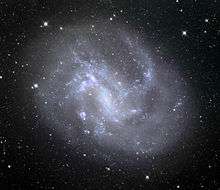NGC 4395
| NGC 4395 | |
|---|---|
|
| |
| Observation data (J2000 epoch) | |
| Right ascension | 12h 25m 48.9s[1] |
| Declination | +33° 32′ 48″[1] |
| Redshift | 319 ± 1 km/s[1] |
| Apparent magnitude (V) | 10.6[1] |
| Characteristics | |
| Type | SA(s)m[1] |
| Apparent size (V) | 13′.2 × 11′.0[1] |
| Other designations | |
| NGC 4399 through 4401,[2] UGC 7542,[1] PGC 40596[1] | |

NGC 4395 by HST
NGC 4395 is a low surface brightness spiral galaxy with a halo that is about 8′ in diameter. It has several wide areas of greater brightness running northwest to southeast. The one furthest southeast is the brightest. Three of the patches have their own NGC numbers: 4401, 4400, and 4399 running east to west.[2]

NGC 4395 in 32 inch telescope
The nucleus of NGC 4395 is active and the galaxy is classified as a Seyfert. It is notable for containing one of the smallest supermassive black hole with an accurately-determined mass.[3] The central black hole has a mass of "only" 300,000 Sun masses,[4] which would make it a so-called "intermediate-mass black hole".
References
- 1 2 3 4 5 6 7 8 "NASA/IPAC Extragalactic Database". Results for. Retrieved 2006-11-04.
- 1 2 Kepple, George Robert; Glen W. Sanner (1998). The Night Sky Observer's Guide, Volume 2. Willmann-Bell, Inc. p. 48. ISBN 0-943396-60-3.
- ↑ Merritt, David (2013). Dynamics and Evolution of Galactic Nuclei. Princeton, NJ: Princeton University Press. ISBN 9781400846122.
- ↑ Peterson, Bradley; et al. (2005). "Multiwavelength Monitoring of the Dwarf Seyfert 1 Galaxy NGC 4395. I. A Reverberation-based Measurement of the Black Hole Mass". The Astrophysical Journal. 632: 799–808. arXiv:astro-ph/0506665
 . Bibcode:2005ApJ...632..799P. doi:10.1086/444494.
. Bibcode:2005ApJ...632..799P. doi:10.1086/444494.
This article is issued from Wikipedia - version of the 6/25/2016. The text is available under the Creative Commons Attribution/Share Alike but additional terms may apply for the media files.
